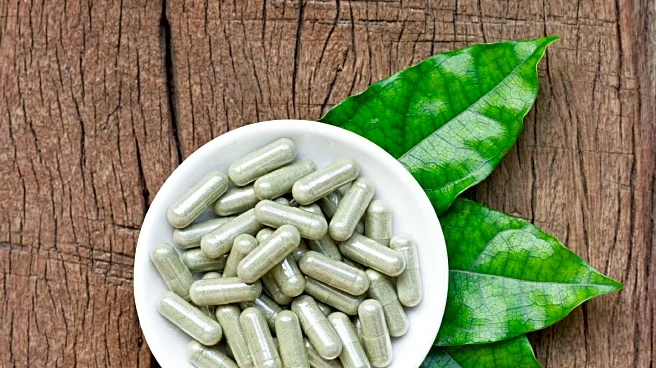What's Happening?
L-theanine, an amino acid found in green tea, is gaining attention for its ability to promote 'relaxed alertness,' a state of calm focus without sedation. According to registered dietitian Sarah Koszyk, L-theanine works by reducing excitatory signals in the brain while boosting calming neurotransmitters like GABA. This results in enhanced cognitive performance without the jittery effects often associated with caffeine. The compound is also noted for its potential antioxidant properties, which may support the body's stress response. Various forms of L-theanine supplements, including capsules and matcha, are recommended by experts for their purity and efficacy. These supplements are particularly popular among those seeking to improve focus, productivity, and sleep quality.
Why It's Important?
The growing interest in L-theanine supplements reflects a broader trend towards natural and plant-based solutions for mental health and cognitive enhancement. As stress and anxiety levels rise, particularly in high-pressure environments, L-theanine offers a non-pharmaceutical option for managing these issues. Its ability to enhance focus and productivity without the side effects of traditional stimulants makes it appealing to a wide range of consumers, from students to professionals. Additionally, the potential antioxidant benefits of L-theanine could contribute to overall health and well-being, making it a valuable addition to wellness routines.
What's Next?
As research into L-theanine continues, its applications may expand beyond current uses. The supplement industry is likely to see increased demand for L-theanine products, prompting further innovation in delivery methods and formulations. Consumers may also become more discerning, seeking out products with verified quality and efficacy. Regulatory bodies might take a closer look at the claims made by supplement manufacturers, ensuring that consumers receive accurate information about the benefits and potential side effects of L-theanine.
Beyond the Headlines
The rise of L-theanine supplements highlights a cultural shift towards self-care and proactive health management. As individuals seek to optimize their mental and physical health, the demand for natural supplements is expected to grow. This trend may also influence the healthcare industry, encouraging more research into the benefits of natural compounds and their integration into traditional medical practices.









